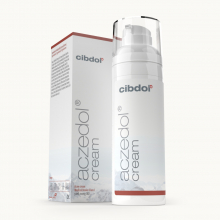Can Dehydration Cause Acne?
Published:
Drinking enough water is crucial for clear, healthy skin. Dehydration can worsen acne symptoms. Here's what you need to know about the link between dehydration and acne.
Contents:
When your skin lacks water, it can lead to a variety of issues. Dry, flaky skin is the most obvious side effect, but dehydration can also make acne worse.
So can dehydration cause acne? Let's take a closer look at the connection between skin hydration and acne.

How Dehydration Affects Your Skin
Water makes up 70% of your body. It’s needed for practically every bodily function. That includes keeping your skin supple and healthy.
When you don’t drink enough fluids, it causes dehydration. Mild dehydration occurs when you lose just 1-2% of your body's water content. At 5% water loss, dehydration becomes moderate to severe.
Dehydration affects skin health in several ways:
- It reduces blood flow. Blood carries oxygen and nutrients to skin cells. Dehydration lowers blood volume, so less reaches the skin.
- It causes dryness. Water gives skin elasticity. Without it, skin becomes dry, flaky, and irritated.
- It may trigger inflammation. Some research indicates dehydration increases inflammatory responses in the body. This can worsen acne.
- It slows cell turnover. Hydrated skin regenerates itself better. Dead skin cells shed faster. When dehydrated, they build up and clog pores.
- It raises cortisol. Dehydration is a stressor that elevates cortisol. This hormone can trigger acne flares.
In essence, dehydration creates an environment where acne is more likely to occur. But does it directly cause pimples to form? Let's explore that next.
Can Dehydration Directly Promote Acne?
Sebum and dead skin cells clog pores, creating the perfect breeding ground for pimples. But what initiates excess oil production and skin cell buildup in the first place?
Research into dehydration’s role is limited. But some evidence suggests it may contribute to acne:
- One study found severely dehydrated skin had more acne lesions. Participants drank less than one liter of water daily. After seven days, researchers noted significantly higher numbers of acne lesions. Skin oil production also increased.
- Dehydration may alter skin microbiota. The bacterial environment on dehydrated skin favors Cutibacterium acnes, the bacteria linked to acne, according to one study.
- It appears to affect certain acne-related hormones. In one experiment, dehydrated women had higher testosterone. This androgen hormone stimulates oil glands and aggravates breakouts.
Based on early research, it seems probable that dehydration can promote acne directly by increasing oiliness and bacterial growth. But much more study is needed to confirm this connection.
Right now, experts view dehydration as an indirect acne trigger. It creates an internal environment where breakouts are more likely, but may not directly cause pimples singlehandedly.
Next, let’s look at some telltale signs of dehydrated skin that may indicate an acne problem.
Signs Dehydration Is Worsening Your Breakouts
How can you tell if unwanted acne is linked to not drinking enough water? Here are some common signs:
1. Increased Oiliness
When dehydrated, your skin tends to overcompensate by producing excess oil. The result? A super greasy, shiny complexion.
2. More Frequent Breakouts
If pimples seem to constantly reappear after you wash your face, dehydration may be the culprit. Lack of water dries out and irritates skin. This can worsen acne.
3. Acne Around the Mouth and Jawline
Pimples often flare up around the mouth and jaw when you’re dehydrated. People tend to touch these areas more, spreading bacteria.
4. Itchy or Tight Sensations
Dehydrated skin often feels tight, itchy, or uncomfortable. An overly dry complexion can lead to more compulsive face touching. And that causes extra oil, dirt, and germs to get into pores.
5. Excessive Thirst and Fatigue
If you constantly feel parched or sluggish, it’s a red flag you’re dehydrated. Pay attention to these thirst and fatigue signals. Your skin needs more hydration.
6. More Severe Acne Reactions
Intense inflammatory acne like painful cysts or nodules may erupt when dehydrated. Lack of fluids is a form of stress. It can worsen the body’s inflammatory response.
7. Slow Healing Blemishes
Acne is likely to scar or linger longer if your skin doesn't have enough moisture to heal quickly. Drink up and provide your skin with water to speed up renewal.
What’s The Right Amount of Water To Drink For Clear Skin?
Now that you know dehydration can negatively affect acne, how much water should you drink? It depends on various factors like age, gender, activity level, and climate.
But in general, aim for at least 2-3 liters of total fluids daily. That's equal to roughly eight 8-ounce glasses of water.
Pay attention to your urine color. Pale or nearly clear pee means you're well hydrated. Dark yellow urine is a sign you need to gulp more fluids, especially water.
Thirst isn’t always the best gauge for hydration needs. By the time you feel thirsty, you may already be dehydrated. Focus on drinking water consistently throughout the day.
Along with sufficient water intake, a healthy diet full of water-rich fruits and vegetables helps hydrate skin from within. Foods like cucumbers, berries, melons, lettuce, and tomatoes work wonders.
Can’t seem to drink enough plain water? Add lemon, mint, cucumber or fruit slices to add flavor. Herbal teas and coconut water also help meet fluid needs.
7 Tips To Hydrate Your Skin & Prevent Acne
Drinking more water is clearly key for gorgeous, clear skin. But other habits contribute to optimal hydration too:
1. Limit Dehydrating Drinks
Cut back on caffeine and alcohol which can dehydrate. Drink plenty of water in between to counterbalance.
2. Eat More Hydrating Foods
Fruits, veggies, broth-based soups, yogurt, and oatmeal hydrate from the inside out.
3. Maintain Barrier Function
Harsh products strip away natural oils. Use gentle cleansers and moisturize to seal in hydration.
4. Boost Internal Hydration
Supplements like hyaluronic acid, ceramides, and vitamin B7 biotin promote moisture retention.
5. Mask Up
Hydrating masks deliver a surge of topical hydration to thirsty complexions.
6. Lock In Moisture
Applying toner and serums on damp skin traps added hydration in the upper layers.
7. Boost Environmental Hydration
Use humidifiers and avoid super hot showers that dehydrate.
With these tips, you can supercharge hydration for clear, acne-free skin. Just don’t overdo it. There is such a thing as too much water.
Can You Drink Too Much Water for Your Skin?
Is more hydration always better when trying to fix acne? Not necessarily.
Drinking excessive amounts of water can disrupt electrolyte balance. Electrolytes like sodium, calcium and potassium help transport water in the body.
Too much water and too little electrolytes leads to a condition called hyponatremia. This essentially over-dilutes bodily fluids.
Side effects of hyponatremia include:
- Fatigue
- Nausea
- Headaches
- Muscle weakness, spasms and cramps
- Swelling in hands and feet
- Confusion
In rare cases, excessive water intake can be fatal. So aim for moderate hydration, not over-hydration. Stick to the standard daily recommendation of 2-3 liters max per day.
Only drink more if you’re sweating heavily, ill with vomiting or diarrhea, or live in a hot climate. Pay attention to electrolyte balance too.
Summary
Can dehydration directly cause acne? The limited research suggests it likely plays a secondary role. Mild to moderate dehydration indirectly creates the ideal breeding ground for pimples.
Dehydration appears to increase oil production, slow skin cell turnover, alter pH, worsen inflammation, and raise stress hormones. All of these factors can worsen breakouts.
While drinking more water alone won’t miraculously cure acne, optimal hydration supports clear skin. Aim for around eight glasses of fluids daily. Limit dehydrating drinks like coffee and alcohol. And eat plenty of hydrating fruits, veggies, and healthy fats.
With the right balance of water intake and hydrating habits, you’ll set your skin up for a clear, radiant glow.
Frequently Asked Questions on Dehydration and Acne
What causes dehydration?
Dehydration occurs when the body loses more water than it takes in. Causes include sweating, vomiting, diarrhea, excessive alcohol intake, medications like diuretics, high temperatures, and not drinking enough fluids.
How much water should you drink for clear skin?
Most adults should aim for 2-3 liters of total fluid intake per day. Drink whenever thirsty and get fluids from water, herbal tea, fruits, vegetables, broth soups and the like. Limit caffeine and alcohol which can dehydrate.
Do certain skin types need extra hydration?
Yes. Those with naturally dry skin types like eczema-prone skin require more hydration for clear, healthy skin. Oily and acne-prone skin also relies on proper hydration to prevent excessive oiliness.
What vitamins help hydrate skin?
Vitamins C, B7 biotin, B3 niacinamide, and E enhance skin hydration. Vitamin C enables collagen production to maintain youthful skin. B vitamins aid cell growth and skin renewal. Vitamin E strengthens skin's protective barrier.
How does dehydration cause wrinkles?
Lack of fluids reduces elasticity and plumpness as skin loses cushioning. This allows fine lines and wrinkles to form more easily. Dehydration also impairs new collagen formation which prevents wrinkles. Stay hydrated to keep skin supple.
Can electrolytes help hydrate your skin?
Yes. Electrolytes like potassium, magnesium and sodium help the body absorb and distribute water efficiently. Eating electrolyte-rich foods or taking supplements helps optimize hydration.
Which ingredients in skincare products boost hydration?
Hyaluronic acid, glycerin, ceramides, squalane, aloe vera, and sodium PCA are excellent hydrating ingredients to look for in serums, mists, moisturizers and cleansers. They attract and seal in moisture.
Should you avoid dehydrating foods when trying to hydrate skin?
It's fine to eat some naturally dehydrating foods like caffeine, alcohol, and processed carbs in moderation. Just be sure to increase water intake before and after to counterbalance. Focus on eating more hydrating foods overall.
How can you tell if you are dehydrated?
Signs of dehydration include excessive thirst, fatigue, dizziness, infrequent urination, dark urine, dry mouth, headaches, constipation, poor skin elasticity, and increased heart rate. Pay attention to these cues.
Does the temperature of water affect skin hydration?
Room temperature or lukewarm water is best. Ice cold water constricts blood vessels, reducing circulation. And some research shows warm water may be absorbed more efficiently. Avoid extremely hot water which strips natural oils.
Can drinking too much water damage skin?
Consuming over 1 gallon daily for extended periods can potentially lead to mineral imbalances that impair skin health. Stick to the recommended 64 ounces, increasing temporarily if ill or active in hot weather.
How does hydration help acne scars heal faster?
Scars need sufficient nutrition and blood flow to remodel damaged tissue. Proper hydration enhances circulation, delivers nutrients, removes waste, and speeds cell renewal for faster fading of acne marks.
Can steaming help hydrate acne-prone skin?
Yes. Facial steaming opens pores and allows humectant ingredients to penetrate better. Gently pat in hydrating serums or masks after to boost hydration. Avoid over-steaming which dries out skin.
What's the best way to ensure skin is hydrated overnight?
Apply oil or hydrating overnight masks before bedtime to seal in moisture. Sleep in a cool, humid room. Avoid unbreathable fabrics that contact skin. Supplements like hyaluronic acid also boost overnight hydration.














